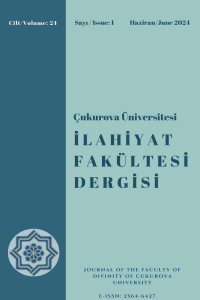Is This The Transformation of Religious Morality into Atheist Morality (?): A Commentary On The Green Night
Öz
In this article, we shall present a critical analysis of the work The Green Night authored by Reşat Nuri Güntekin (1889-1956). Reşat Nuri's novel Green Night revealed to a certain extent the identity change that occurred in the people who formed the state as the Ottoman Empire transformed into the Republic of Turkey. The basis of the plot is the willingness to reveal the irreconcilability of reforms or revolutionism made with religious beliefs. Religion is presented as the cause of backwardness and hostile feelings in society. The aim is also to portray religions and particularly Islam as the source of all evil. However, Reşat Nuri evaluated the incident based on the people's wrong and erroneous beliefs. It means that the issue was not addressed as specified in the original texts of Islam, but the wrong interpretation, practice, and perception were opted for. Reşat Nuri also presents an explication of the dominant cultural forms of his time in his works. In the novel, he presents Western education as a way out of the mechanism of meaning in which the subject with an Eastern/Muslim identity is trapped.
Anahtar Kelimeler
Literature Reşat Nuri The Green Night Moral Religion Atheism
Kaynakça
- Ağaoğlu, Samet. Babamın Arkadaşları. İstanbul: Nebioğlu Yayınları, (t.y.).
- Aksoy, Ekrem. “Başlangıcından Günümüze Türkiye’de Fransız Okulları”. Synergies Turquie 8 (2015), 29-46.
- Emil, Birol. Reşat Nuri Güntekin. Ankara: Kültür Bakanlığı Yayınları, 1989.
- Gülendam, Ramazan. “Bazı Cumhuriyet Dönemi Romancılarının Dine ve Din Adamına Bakışı”. Bilim, Ahlak ve Sanat Bağlamında Çağdaş İslam Algıları II. edt. C. Batuk, H. Atsız, Samsun: Canik Belediyesi, 2012, 325-343.
- Günday, Rıfat. “Emile Zola’nın Gerçek ve Reşat Nuri Güntekin’in Yeşil Gece Adlı Romanlarında Rahip/Hoca ve Öğretmen Tipleri”. Pamukkale Üniversitesi Sosyal Bilimler Enstitüsü Dergisi 18 (2014), 115-134.
- Güntekin, Reşat Nuri. Yeşil Gece. İstanbul: İnkılap Yayınları, (t.y.).
- Kılıçkaya, Derya. “Yeşil Gece ve Gurbet Yavrum Romanları Örneğinde Safi İnanç, Cehalet ve İstismar Arasında Cumhuriyet Devri Türk Toplumunun Din Algısı”. İslami İlimler Dergisi, 18/1 (2023), 157-181.
- Mert, Necati. “Anadolu’ya Reşat Nuri Gibi Bakmak ve Bakmamak”. Düşler/Öyküler, 3 (1997), 151-152.
- Naci, Fethi. Reşat Nuri’nin Romancılığı. İstanbul: Oğlak Yayınları, 1995.
- Şan, Mustafa Kemal. Toplumsal Gerçeklik ve Roman. Ankara: Pruva Yayınları, 2020.
- Tatarlı, İbrahim, Mollov, Rıza. Marksist Açıdan Türk Romanı, İstanbul: Habora Kitabevi, 1969.
- Timur, Taner. Osmanlı-Türk Romanında Tarih, Toplum ve Kimlik. 2. Baskı. İstanbul: İmge Yayınları, 2002.
- Yavuz, Hilmi. “Reşat Nuri Güntekin’in Yeşil Gece’si İslamiyet’e Karşı Bir Roman Mı?”, Edebiyat ve Sanat Üzerine Yazılar. 2. Baskı. İstanbul: Yapı Kredi Yayınları, 2008.
Öz
Makalemizde Reşat Nuri Güntekin’in (1889-1956) yazdığı Yeşil Gece adlı eserin eleştirel bir tahlilini ortaya koymaya çalışacağız. Reşat Nuri’nin Yeşil Gece adlı romanı Osmanlı İmparatorluğu’nun Türkiye Cumhuriyeti’ne dönüşürken devleti oluşturan insanlarda meydana gelen kimlik değişimini belli ölçüde ortaya koymuştur. Konunun temeli dinî inançlarla yapılan inkılapların veya inkılapçılığın birbiriyle uzlaşmazlığını gösterme isteğidir. Geri kalmanın ve toplumda düşmanca duygular beslemenin sebebi olarak din gösterilmiştir. Amaç dinleri ve özellikle İslam dinini bütün kötülüklerin kaynağı olarak göstermek isteğidir. Fakat Reşat Nuri, halkın yanlış ve hatalı inançlarından hareketle olayı değerlendirmiştir. Yani İslam dininin asli metinlerinde belirtilen şekilde konuya değinilmemiş: hatalı yorum, uygulama ve algılama şekli tercih edilmiştir. Reşat Nuri, eserlerinde yaşadığı dönemin hâkim kültürel formlarının bir yorumunu da sunmuştur. Romanda Doğulu/Müslüman kimliğine sahip olan öznenin içine hapsolduğu anlam mekanizmasından bir çıkış yolu olarak Batılı eğitimi sunması söz konusudur.
Anahtar Kelimeler
Kaynakça
- Ağaoğlu, Samet. Babamın Arkadaşları. İstanbul: Nebioğlu Yayınları, (t.y.).
- Aksoy, Ekrem. “Başlangıcından Günümüze Türkiye’de Fransız Okulları”. Synergies Turquie 8 (2015), 29-46.
- Emil, Birol. Reşat Nuri Güntekin. Ankara: Kültür Bakanlığı Yayınları, 1989.
- Gülendam, Ramazan. “Bazı Cumhuriyet Dönemi Romancılarının Dine ve Din Adamına Bakışı”. Bilim, Ahlak ve Sanat Bağlamında Çağdaş İslam Algıları II. edt. C. Batuk, H. Atsız, Samsun: Canik Belediyesi, 2012, 325-343.
- Günday, Rıfat. “Emile Zola’nın Gerçek ve Reşat Nuri Güntekin’in Yeşil Gece Adlı Romanlarında Rahip/Hoca ve Öğretmen Tipleri”. Pamukkale Üniversitesi Sosyal Bilimler Enstitüsü Dergisi 18 (2014), 115-134.
- Güntekin, Reşat Nuri. Yeşil Gece. İstanbul: İnkılap Yayınları, (t.y.).
- Kılıçkaya, Derya. “Yeşil Gece ve Gurbet Yavrum Romanları Örneğinde Safi İnanç, Cehalet ve İstismar Arasında Cumhuriyet Devri Türk Toplumunun Din Algısı”. İslami İlimler Dergisi, 18/1 (2023), 157-181.
- Mert, Necati. “Anadolu’ya Reşat Nuri Gibi Bakmak ve Bakmamak”. Düşler/Öyküler, 3 (1997), 151-152.
- Naci, Fethi. Reşat Nuri’nin Romancılığı. İstanbul: Oğlak Yayınları, 1995.
- Şan, Mustafa Kemal. Toplumsal Gerçeklik ve Roman. Ankara: Pruva Yayınları, 2020.
- Tatarlı, İbrahim, Mollov, Rıza. Marksist Açıdan Türk Romanı, İstanbul: Habora Kitabevi, 1969.
- Timur, Taner. Osmanlı-Türk Romanında Tarih, Toplum ve Kimlik. 2. Baskı. İstanbul: İmge Yayınları, 2002.
- Yavuz, Hilmi. “Reşat Nuri Güntekin’in Yeşil Gece’si İslamiyet’e Karşı Bir Roman Mı?”, Edebiyat ve Sanat Üzerine Yazılar. 2. Baskı. İstanbul: Yapı Kredi Yayınları, 2008.
Ayrıntılar
| Birincil Dil | Türkçe |
|---|---|
| Konular | Basılı Kültür, Genç Yetişkin Edebiyatı |
| Bölüm | Makaleler |
| Yazarlar | |
| Erken Görünüm Tarihi | 29 Haziran 2024 |
| Yayımlanma Tarihi | 30 Haziran 2024 |
| Gönderilme Tarihi | 26 Ocak 2024 |
| Kabul Tarihi | 21 Mayıs 2024 |
| Yayımlandığı Sayı | Yıl 2024 Cilt: 24 Sayı: 1 |
Kaynak Göster
Correspondence Address
Cukurova University, Faculty of Theology, Balcali Campus, 01330, Saricam/Adana.


